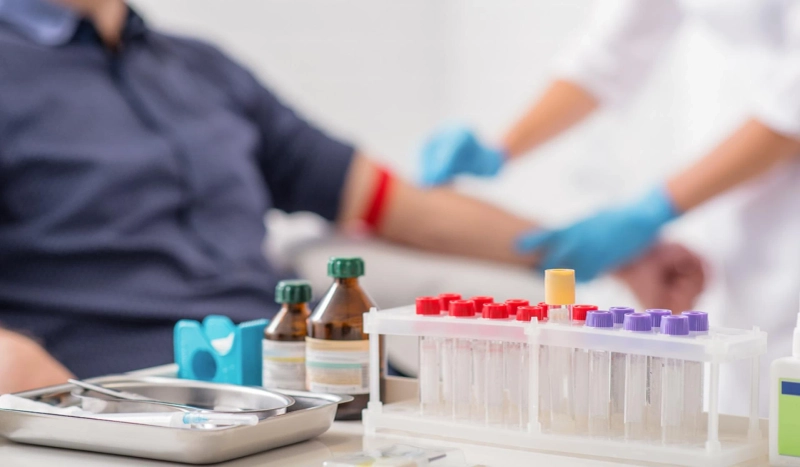In the realm of modern healthcare, diagnostic tests stand as crucial tools aiding healthcare professionals in uncovering ailments, assessing conditions, and crafting tailored treatment plans. These tests serve as pivotal gateways to understanding the complexities of the human body, allowing for precise diagnoses and informed medical decisions. From routine check-ups to intricate medical investigations, a plethora of diagnostic tests exists, each serving distinct purposes. Let's delve into some of the most common diagnostic tests that shape contemporary healthcare practices.
Medcare Diagnostics is the Best Diagnostic Centre In Mumbai renowned for its comprehensive range of diagnostic services, offering cutting-edge medical imaging, pathology tests, and specialized diagnostics. Equipped with the latest machinery and manned by highly skilled professionals, Medcare Diagnostics ensures accurate and prompt test results. Their commitment to quality healthcare and patient-centric approach has garnered trust and acclaim from the local community.
Blood Tests:Blood tests, or blood panels, are among the most frequently performed diagnostic tests. They provide a comprehensive overview of an individual's health by analyzing blood components like red blood cells, white blood cells, platelets, and various biomarkers. These tests aid in detecting conditions such as anemia, infections, diabetes, and organ function abnormalities.
Imaging Studies:X-rays: Utilizing electromagnetic radiation, X-rays produce images of bones and certain tissues. They are invaluable in detecting fractures, lung infections, and abnormalities in the skeletal system.
CT Scans (Computed Tomography): This advanced imaging technique creates detailed cross-sectional images of the body. CT scans assist in diagnosing tumors, vascular conditions, and internal injuries.
MRI (Magnetic Resonance Imaging): By using powerful magnets and radio waves, MRIs generate detailed images of organs and tissues. They are especially useful in identifying brain and spinal cord disorders, as well as soft tissue injuries.
Urinalysis:A urinalysis examines urine samples to evaluate kidney function, detect urinary tract infections, diabetes, and other metabolic disorders. It involves assessing the color, clarity, concentration, and content of the urine.
Electrocardiogram (ECG or EKG):An ECG measures the electrical activity of the heart to diagnose heart conditions such as arrhythmias, heart attacks, and abnormalities in heart structure or function.
Biopsies:Biopsies involve extracting a sample of tissue or cells for microscopic examination. This aids in diagnosing cancers, identifying abnormal tissue growth, and determining the nature of certain diseases.
Genetic Testing:Genetic tests analyze an individual's DNA to identify inherited conditions, assess the risk of developing specific diseases, and guide personalized treatment approaches.
Endoscopy:Endoscopic procedures employ a flexible tube with a camera to visualize internal organs like the gastrointestinal tract, respiratory system, and urinary system. They help in diagnosing conditions like ulcers, tumors, and digestive disorders.
Pap Smears and Mammograms:Pap smears screen for cervical cancer by examining cervical cells, while mammograms detect breast abnormalities, including tumors or cysts, aiding in the early detection of breast cancer.
These diagnostic tests, among others, form the backbone of modern medical diagnoses and treatment plans. They enable healthcare providers to offer personalized care, early disease detection, and effective management strategies. However, while these tests are invaluable, their utility depends on accurate interpretation and integration with clinical context.
As healthcare advances, diagnostic tests continue to evolve, becoming more precise, non-invasive, and accessible. Embracing these advancements ensures enhanced patient care, better disease management, and improved health outcomes.
Remember, while these tests are crucial, their necessity should always be determined by healthcare professionals based on individual health concerns and symptoms. Regular check-ups and open communication with healthcare providers remain key to maintaining optimal health.
In the ever-evolving landscape of healthcare, diagnostic tests play an indispensable role, illuminating the path towards better health and well-being.
Discover precision and reliability Best Pathology Lab in Mumbai in diagnostics! Experience the excellence of Mumbai's top-notch Pathology Lab today. Trust cutting-edge technology and expertise for accurate results. Your health deserves the best – schedule your appointment now!


